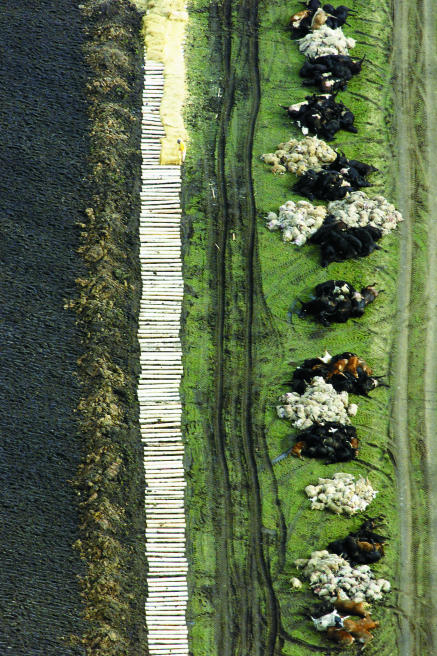Public health concerns are growing across the United Kingdom over the disposal of animals culled in the foot and mouth outbreak. With smoke from nearby pyres drifting daily over many village communities, fears of an increase in respiratory illness have compounded existing anxieties about the risk of decaying carcasses contaminating drinking water supplies and the toxic effects of excessive exposure to disinfectant.
Several health alerts have been reported. In Dumfries and Galloway air quality tests were ordered after Annandale and Eskdale Council for Voluntary Service claimed that bitumen, red diesel, and coal were being used in pyres for slaughtered animals and could cause health problems for the local population.
At Tow Law in County Durham 900 sheep and cattle buried in a disused quarry were dug up again after the Environment Agency warned that polluted material could filter through gravel beds into a spring supplying water to local farms.
A mass incineration of carcasses at Tern Hill airfield in Shropshire was postponed after protesters threatened legal action, and a pyre in Cumbria with 200 cows waiting to be burned was dismantled after fears for the health of local villagers.
Dr Lesley Morrison, of the Teviot Medical Practice, Hawick, near the Scottish border, is just a few miles away from a confirmed case of foot and mouth disease and sites of mass slaughter. She says concerns are mounting in her area about the public health implications of the outbreak: “Smoke from the burning pyres is toxic, and countless people in rural communities are being exposed to it on a daily basis. Vast volumes of disinfectant are running off into our water. What will we be drinking in a few weeks' time?”
More than 1000 cases of foot and mouth disease have been reported since February, and one million animals have either been culled already or are earmarked for culling. The government's chief scientist Professor David King suggests that the worst of the outbreak may be over. The Ministry of Agriculture, Fisheries and Food (MAFF) is working closely with the Environment Agency to minimise any impact on public health.
The agency's preferred method of disposal is rendering, but, because of the number of animals involved, carcasses are also being incinerated at licensed incinerators, buried at licensed landfill sites, and buried or burnt on land assessed as suitable by the Environment Agency.
The agency is also helping local councils carry out risk assessments and air quality measurements. This includes giving advice on using MAFF approved biodegradable disinfectant and how to dispose of unusable milk.
Because of the backlog of carcasses, many still lie decomposing on farms, causing a distressing reminder to affected farmers. Indeed, anxiety and depression among farmers is one of the main public health concerns arising from the outbreak.
Counselling and advice is available from the Rural Stress Information Network on 024 7641 2916.
Figure.
JEFF J MITCHELL/REUTERS 2001
Piles of animal carcasses await disposal in Cumbria



